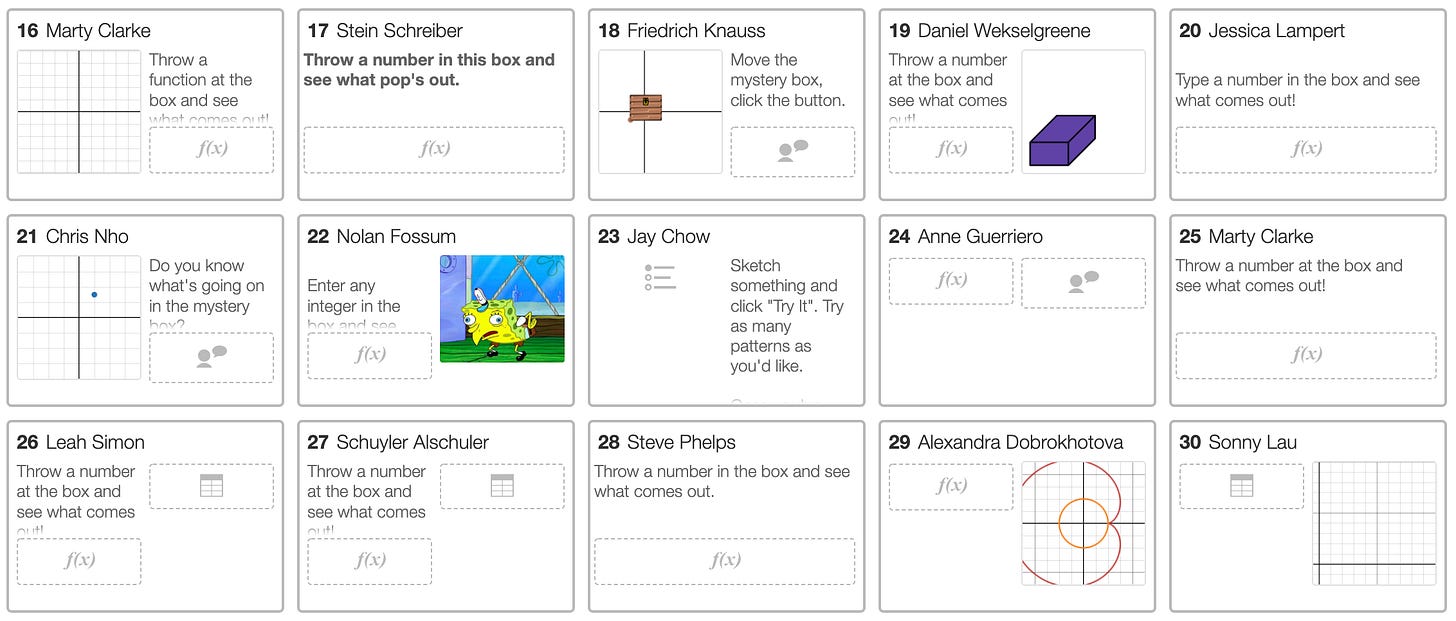Check Out These Thirty Mathematical Mystery Boxes
So much creativity from so many math teachers.
Check out this collection of thirty Mathematical Mystery Boxes created by people in our community! (See background & contest announcement.)
Here you have thirty different experiences where someone takes infinite inputs which any student can provide, applies some kind of mathematical rule to them, and then invites students to think about the rule.
People created mystery boxes out of points, numbers, multiple numbers, squares, lines, robots, polar graphs, cartoon characters, even literal boxes.
My move was always to bang on the boxes fairly wildly at first, trying to figure out the general shape of the rule, before applying pressure more systematically. With numbers, I’d try 1 and 0. With points, I’d try the origin or the axes.
Special shout out to people who recorded some evidence of my previous tries. Another shout out to people who added a little delay to the machine. One last shout out to Dylan Kane, whose mystery box baffled me even after I set it aside.
Marty Clarke used the mathematical mystery box with students:
On my last day with students as part of a recurring math circle, I stole your idea for a mystery box and had a progression of 5 slides. The first couple were for them to understand the box and think about how they tested/when they felt sure about knowing the rule. It was pretty much pandemonium after that in the most fun way. The floor function was a real wrench and so was getting an undefined output. Lot of talk in the end about adjusting our disposition away from just checking natural numbers and thinking about when different types of numbers would reveal much more information. All in all, a real treat!
Every participant got some commentary from our in-house Computation Layer experts, Leah Simon, Schuyler Alschuler, John Rowe, and Jay Chow. (Check the teacher notes.) Some of y’all submitted student links that, sadly here, expired before I accessed them. Three people (Nolan Fossum, Andy Malbouef, and Jessica Lampert) are getting themselves some Desmos Classroom gear in a random drawing from all the contributors. Me, I got a huge charge seeing so much mathematical creativity from so many people in the middle of the summer. Thanks for playing, folks.
What Else
What are your mathematical “points of power”?
A provocative thread about education conferences and the people they typically feature.
Great thread of non-curricular math tasks for helping students develop the ability to struggle and collaborate.
“What is the area and perimeter of the hexagon?” I love problems like this, ones that are posed simply and directly–just a pencil and paper–that unfold and grow in your mind afterewards.
Geoff Krall is bringing blogging back with his three-part series on improving students’ ideas about mathematics.

